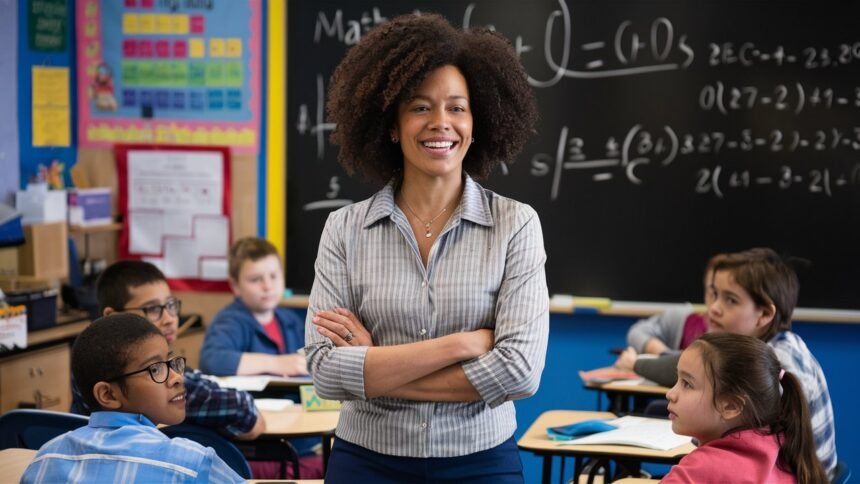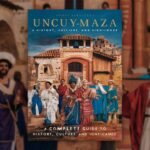Christina Orlando, a dedicated math teacher based in Quebec, has become a beacon of inspiration for students and educators alike. With over 15 years of experience in the classroom, Orlando has transformed the way mathematics is perceived and taught, blending traditional pedagogy with modern innovation. Her approach emphasizes accessibility, creativity, and real-world relevance, ensuring that even the most hesitant learners develop confidence in their mathematical abilities. This article explores Orlando’s unique teaching philosophy, her groundbreaking methods, and the lasting impact she has made on Quebec’s educational landscape. Whether you’re an educator seeking inspiration or a parent curious about her methods, this deep dive into Christina Orlando’s career offers valuable insights into the future of math education.
Christina Orlando’s Teaching Philosophy: Building Confidence Through Engagement
At the core of Christina Orlando’s success is her belief that every student can excel in math with the right guidance. She rejects the notion that mathematical aptitude is innate, instead framing math as a skill to be nurtured through practice and curiosity. Orlando prioritizes creating a supportive classroom environment where mistakes are celebrated as learning opportunities. Her lessons often begin with open-ended questions that encourage critical thinking, such as, “How might geometry influence architecture in Montreal?” By connecting abstract concepts to tangible examples—like using Quebec’s iconic bridges to teach angles—she bridges the gap between theory and application.
Orlando also champions differentiated instruction, tailoring her methods to accommodate diverse learning styles. For visual learners, she incorporates diagrams and interactive software, while hands-on activities like building 3D models cater to kinesthetic students. This philosophy extends beyond academics; she emphasizes soft skills like collaboration and perseverance, preparing students for lifelong success.
Innovative Teaching Methods: Technology and Real-World Applications
Christina Orlando’s classrooms are far from traditional. She integrates technology seamlessly, using tools like GeoGebra and Desmos to visualize complex equations, making them accessible to all learners. During the pandemic, she pioneered hybrid learning models that combined asynchronous video lessons with live problem-solving sessions, ensuring continuity in education. Her YouTube channel, featuring bite-sized tutorials on topics like algebraic expressions and calculus, has garnered thousands of views, extending her influence beyond Quebec.
One standout initiative is her “Math in the Community” project, where students tackle local issues using mathematical reasoning. For example, a recent class analyzed traffic patterns in Quebec City to propose optimized public transit routes. Such projects not only deepen understanding but also instill a sense of civic responsibility. Orlando also hosts annual “Math Fairs,” inviting parents and community members to participate in puzzles and games designed by students. These events demystify math, showcasing its creativity and relevance.
Impact on Students and the Quebec Education System
Orlando’s impact is evident in her students’ achievements. Many of her former pupils have pursued STEM careers, crediting her mentorship for their confidence. One student, now an engineering student at Université de Montréal, recalls how Orlando’s encouragement helped her overcome “math anxiety.” Beyond individual success, Orlando has influenced systemic change. She collaborates with Quebec’s Ministry of Education to revise curricula, advocating for more project-based learning and fewer standardized tests.
Her workshops for fellow teachers—covering topics like inclusive assessment strategies—have been adopted province-wide. In 2022, she received the Prix d’Excellence en Enseignement, Quebec’s highest honor for educators, recognizing her contributions to elevating math literacy.
Overcoming Challenges: Addressing Math Anxiety and Resource Gaps
Despite her successes, Orlando acknowledges persistent challenges. Math anxiety remains widespread, exacerbated by societal stereotypes that frame math as “difficult” or “only for geniuses.” To combat this, she introduces mindfulness exercises before exams and hosts after-school “Math Cafés,” where students practice problems in a low-pressure setting. Resource disparities between urban and rural schools also trouble her. In response, she co-founded a nonprofit that donates tablets and software to underfunded schools, ensuring equitable access to digital tools.
Frequently Asked Questions About Christina Orlando
Q: What makes Christina Orlando’s teaching style unique?
A: Orlando blends technology, real-world projects, and differentiated instruction to create an inclusive environment where students thrive at their own pace.
Q: How does she engage reluctant learners?
A: By linking lessons to students’ interests—e.g., using sports statistics to teach probability—and fostering a growth mindset through positive reinforcement.
Q: What resources does she recommend for parents?
A: Orlando suggests apps like Khan Academy and family math games that turn everyday activities, like cooking, into learning opportunities.
Q: Has she published any educational materials?
A: Yes! She co-authored a workbook series, Math for Life, which aligns with Quebec’s curriculum and is used in over 200 schools.
Q: How can educators adopt her methods?
A: Orlando encourages teachers to start small—incorporate one tech tool or project-based unit—and join professional networks for support.
Conclusion
Christina Orlando’s legacy in Quebec’s education system is a testament to the power of passion and innovation. By reimagining math as a dynamic, accessible subject, she has empowered countless students to embrace challenges and unlock their potential. Her work underscores the importance of adaptability in teaching, especially in an era of rapid technological change. For educators and parents alike, Orlando’s journey offers a roadmap for inspiring the next generation of problem-solvers. As she often says, “Math isn’t about memorizing formulas—it’s about discovering the tools to shape the world.”







